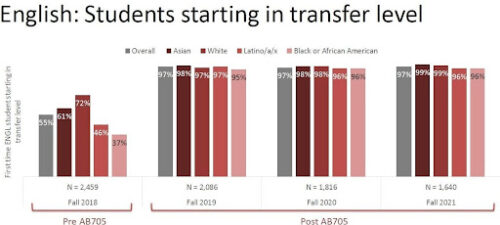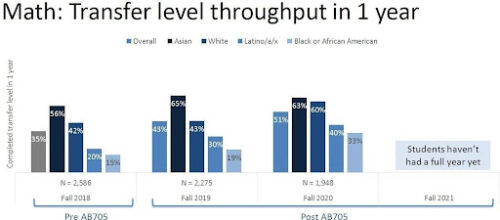Amid AB705 Improvements, Concerns Remain
By Ellen Yoshitsugu
Email egiese@mail.ccsf.edu
In 2017 Governor Gavin Newsom signed Assembly Bill 705, which radically changed student placement in California community colleges. On Sept 29, 2022, he signed Assembly Bill 1705 to “clean up” the earlier bill. The two laws are closely related but effectively bring two different mandates to City College.
By eliminating discriminatory placement tests, AB 705 removed a major barrier to college access, particularly for students of color. But AB 1705 has apparently made success in transfer level classes more difficult for some students by effectively removing all pre-transfer level English and math classes.
“Hey, I used AB 705!” said Henry Drake at the Students Cubed Resource Center. After leaving the military in 2018, despite his previous enrollment at City College and taking pre-calculus in high school, he was forced to take placement tests, and put into a remedial math class. “I was just super frustrated because it’s like a lot of this stuff is repetitive,” said Drake.
But AB 705 changed this. Drake learned from some student activists that, thanks to AB705, if he showed his high school transcripts to a counselor he could skip the remedial class. He chose transfer level statistics, the math class where he felt most comfortable, passed it, and moved ahead much faster towards his kinesiology degree.
AB 705 essentially says that community colleges must maximize the probability of success of students in transfer level English and math classes within one year and must base their placements on the students’ high school record, according to the legislative summary.
The passage of AB 705 was driven by student activists including the local group Students Making a Change (SMAC) and City College’s Angelica Campos, Referral Specialist at the Women’s Resource Center.
“AB705 changed the paradigm, and the change was dramatic and very much for the better.” said Math Department Chair Katia Fuchs by email, “Students who might have been disadvantaged by a placement test and ended up with a very low placement as a result, were able to enroll in transfer-level math classes and succeed when supported adequately.”
“It was truly revolutionary,” she added.
More City College students are taking transfer level classes and passing them at dramatically higher rates since the implementation of AB 705 in 2019. The change has been greatest for students of color, as shown in the graphs below.


Trustee Aliya Chisti said during her office hours that the data is clear. “If you hold students back, they’re less likely to complete overall and over time.” Instead of an exam, she said, “Let’s just give them the support they need to complete the class.”
“These are hard numbers to look at because you want to celebrate a doubling of the throughput rate.” said Tom Boegel, Associate Vice Chancellor, Instructional Support Services. “We have work to do if we still have a rate that’s less than 50%.”
The throughput rate is just the percentage of students completing the class within a certain amount of time.
The college provides extra support including curriculum redesign, embedded tutors, tutoring through the Learning Assistance Department, embedded librarians, faculty professional development, faculty advising, English and math online labs, and a bridge between ESL and English, according to the “Assembly Bill 705 Report” presented June 9, 2022, to the Students Success and Policy Committee meeting of the Board of Trustees, by Lisa Cooper-Wilkins, Vice Chancellor for Student Affairs.
The sequence of pre-transfer level classes has been replaced with what’s called “co-requisite support.” In this new support model, incoming students are placed in transfer level math and English, and, based on their high school record, can be required to take a concurrent support class.
The TRIO Resource Center, and other City College resource centers such as Puente and UMOJA, offer a mix of services to different student populations, said Ghislaine Maze, TRIO’s director. TRIO serves very low income and first generation college students and students with disabilities. Their three tutors are each paired with four sections of English 1AS and are familiar with the assignments, act as coaches and also lead small groups outside of class. In addition, Maze said, they are able to bring other resources, such as financial aid, into the English classes and catch students early in their college careers and say,“ Hey, have you met with a counselor yet? Do you know what you’re majoring in?”
Even after AB705, some colleges around the state continued to place students into remedial classes, and this was happening in the parts of California with the most students of color. Because of this, the Chancellor’s office sent a directive to all colleges in November 2021, that set more stringent guidelines for how to place students into classes. AB 1705 basically codified those guidelines.
“The Chancellor’s Office has tasked us with comparing the throughput rates of students who start in transfer level and students that started in pre-transfer level classes,” Boegel said. “Generally speaking, colleges would only be able to continue to allow students to enroll in pre-transfer level classes if they could show through the data that they were doing just as well as students that are in transfer level. Nearly all colleges were not able to show that that was actually true.”
“So as a result, starting in the fall of 2022 we are no longer offering pre-transfer level English and math classes,” he added.
Some City College community members have raised concerns about the evolving changes to student placement and access. Emily Oryell, Associated Students (AS) Executive Council Treasurer and the AS Secretary for the Ocean Campus, would like to see the English placement website highlight that students only need to show their high school transcripts, instead of emphasizing test scores. She would also like to see better academic advising for incoming students so that they understand the expectations for different classes and can make better choices.
Maze worried about students who leave after attempting English 1A a few times. “It’s hard to say that we’ve just completely removed a set of options.” She noted that a student she helped to withdraw from all their classes was not asked why. “We’re gonna invest in the students’ right to succeed but we’ve gotten leaner and leaner with counselors,” she said.
Fuchs said that the Math department, even before AB705, had been shrinking the pre-transfer offerings. “It’s crucial to understand,” she said, “that students who either didn’t need to take a transfer-level math course for their educational goal, or who self-identified as needing additional review for whatever reasons – had the option to take pre-transfer courses.
“As we continued to decrease the number of sections of pre-transfer courses, demand for them continued to grow- the classes filled up and had full wait lists every semester without fail,” Fuchs said.
Speaking as a math instructor, AFT 2121 President Mary Bravewoman said, “If a student doesn’t pass Math 90 with support, which is (8 units), it’s a big hit to their GPA. If they’re also taking English 1A with support, that’s an extremely full schedule. There is no space for more classes. If they try for 18-20 units and fall behind then it’s a domino effect,” she said.
Bravewoman started in remedial math at City College. “If I had been placed (directly) in precalculus I would have given up and never developed the mental skills, the math maturity, the “muscle memories”, and never discovered the beauty of math. I would have never achieved my B.S. and M.S. in math,” she said.
City College got $1.5M of grant funding towards AB 705 implementation last year, according to City College Chancellor David Martin. For AB 1705, he said, the college is awaiting additional guidance and funding opportunities from the state Chancellor’s Office in spring 2023.
